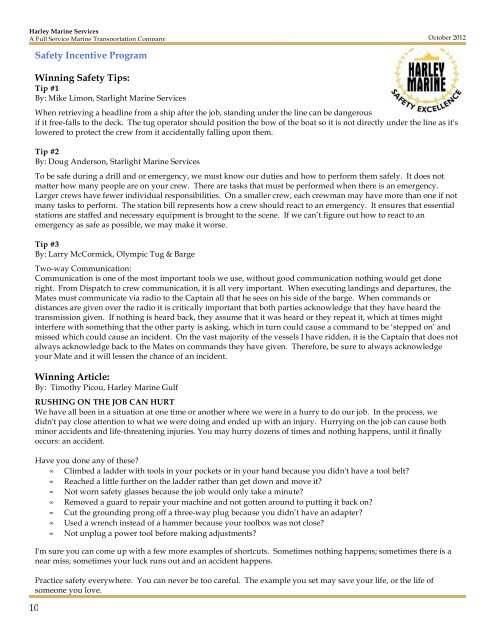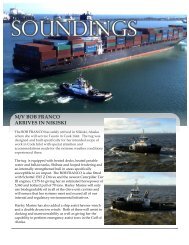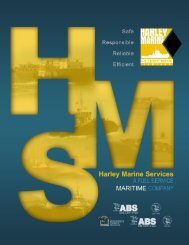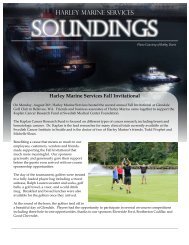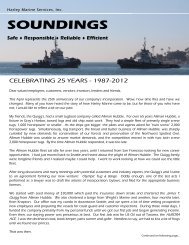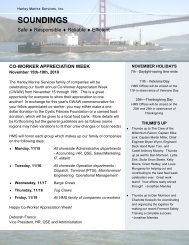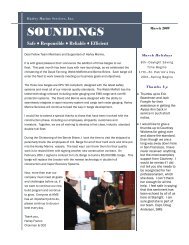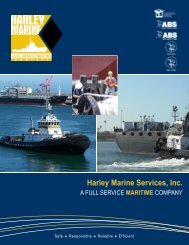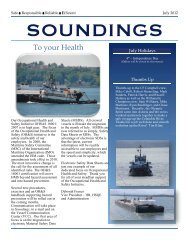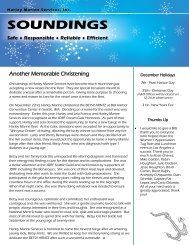October - Harley Marine Services, Inc.
October - Harley Marine Services, Inc.
October - Harley Marine Services, Inc.
You also want an ePaper? Increase the reach of your titles
YUMPU automatically turns print PDFs into web optimized ePapers that Google loves.
<strong>Harley</strong> <strong>Marine</strong> <strong>Services</strong><br />
A Full Service <strong>Marine</strong> Transportation Company<br />
<strong>October</strong> 2012<br />
10<br />
Safety <strong>Inc</strong>entive Program<br />
Winning Safety Tips:<br />
Tip #1<br />
By: Mike Limon, Starlight <strong>Marine</strong> <strong>Services</strong><br />
When retrieving a headline from a ship after the job, standing under the line can be dangerous<br />
if it free-falls to the deck. The tug operator should position the bow of the boat so it is not directly under the line as it's<br />
lowered to protect the crew from it accidentally falling upon them.<br />
Tip #2<br />
By: Doug Anderson, Starlight <strong>Marine</strong> <strong>Services</strong><br />
To be safe during a drill and or emergency, we must know our duties and how to perform them safely. It does not<br />
matter how many people are on your crew. There are tasks that must be performed when there is an emergency.<br />
Larger crews have fewer individual responsibilities. On a smaller crew, each crewman may have more than one if not<br />
many tasks to perform. The station bill represents how a crew should react to an emergency. It ensures that essential<br />
stations are staffed and necessary equipment is brought to the scene. If we can’t figure out how to react to an<br />
emergency as safe as possible, we may make it worse.<br />
Tip #3<br />
By: Larry McCormick, Olympic Tug & Barge<br />
Two-way Communication:<br />
Communication is one of the most important tools we use, without good communication nothing would get done<br />
right. From Dispatch to crew communication, it is all very important. When executing landings and departures, the<br />
Mates must communicate via radio to the Captain all that he sees on his side of the barge. When commands or<br />
distances are given over the radio it is critically important that both parties acknowledge that they have heard the<br />
transmission given. If nothing is heard back, they assume that it was heard or they repeat it, which at times might<br />
interfere with something that the other party is asking, which in turn could cause a command to be ‘stepped on’ and<br />
missed which could cause an incident. On the vast majority of the vessels I have ridden, it is the Captain that does not<br />
always acknowledge back to the Mates on commands they have given. Therefore, be sure to always acknowledge<br />
your Mate and it will lessen the chance of an incident.<br />
Winning Article:<br />
By: Timothy Picou, <strong>Harley</strong> <strong>Marine</strong> Gulf<br />
RUSHING ON THE JOB CAN HURT<br />
We have all been in a situation at one time or another where we were in a hurry to do our job. In the process, we<br />
didn't pay close attention to what we were doing and ended up with an injury. Hurrying on the job can cause both<br />
minor accidents and life-threatening injuries. You may hurry dozens of times and nothing happens, until it finally<br />
occurs: an accident.<br />
Have you done any of these?<br />
• Climbed a ladder with tools in your pockets or in your hand because you didn't have a tool belt?<br />
• Reached a little further on the ladder rather than get down and move it?<br />
• Not worn safety glasses because the job would only take a minute?<br />
• Removed a guard to repair your machine and not gotten around to putting it back on?<br />
• Cut the grounding prong off a three-way plug because you didn’t have an adapter?<br />
• Used a wrench instead of a hammer because your toolbox was not close?<br />
• Not unplug a power tool before making adjustments?<br />
I'm sure you can come up with a few more examples of shortcuts. Sometimes nothing happens; sometimes there is a<br />
near miss; sometimes your luck runs out and an accident happens.<br />
Practice safety everywhere. You can never be too careful. The example you set may save your life, or the life of<br />
someone you love.


